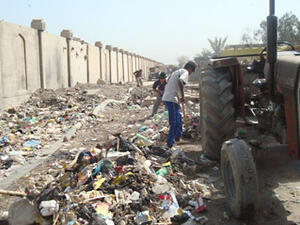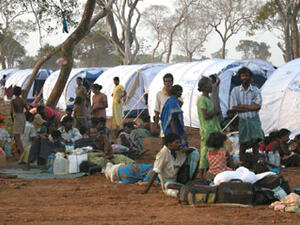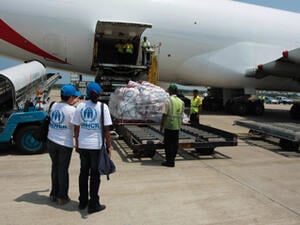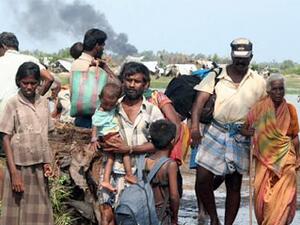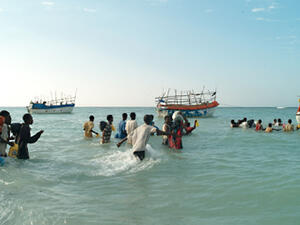Refugees in Zambia receive the skills to be self-sufficient
Refugees in Zambia receive the skills to be self-sufficient
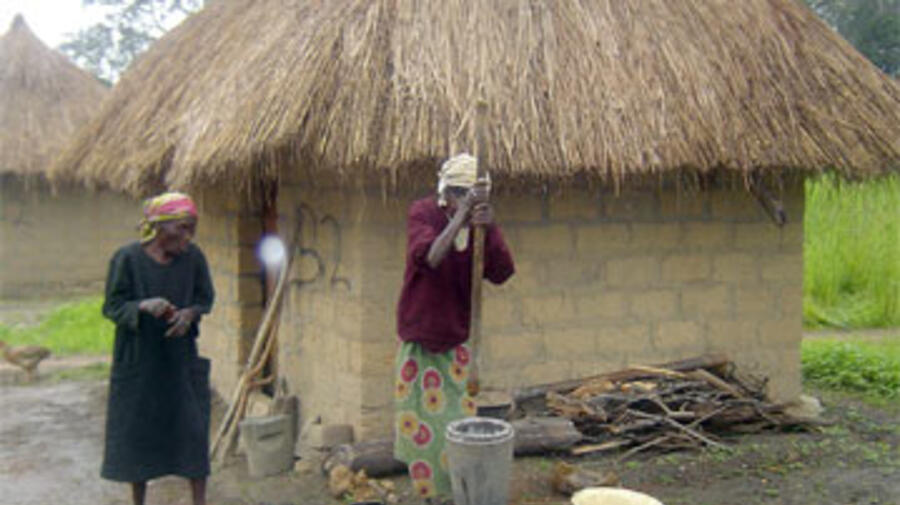
Angolan refugee women pound groundnuts outside a homestead in Meheba, where people are learning to become self-sufficient.
MEHEBA REFUGEE SETTLEMENT, Zambia, February 13 (UNHCR) - Three days each week a group of refugees, including men, women and older children, gather in a classroom in Meheba to learn ways to improve their agriculture and small businesses.
With most refugees who wanted to repatriate now gone home to Angola, UNHCR and the Zambian government are working - through programmes such as the formation of agricultural cooperatives and a micro-credit scheme - to ensure that remaining refugees are gaining the knowledge and skills to become self-sufficient.
Zambia currently hosts 113,000 refugees, with the majority from the Democratic Republic of the Congo. The organized voluntary repatriation of Congolese from two refugee settlements in northern Zambia will continue in 2008, but UNHCR's assisted repatriation programme to Angola concluded a year ago.
Meheba, in the north-west of Zambia, has seen its refugee population decline from about 40,000 in 2002 to the current 14,000, mainly Angolans. Most have lived in Meheba for more than 10 years and consider the settlement as home. However, the government has yet to decide what status will eventually be given to the remaining Angolans and continues to seek a lasting solution with UNHCR.
"While the refugees are here in Meheba, we want to maintain self-sustaining community structures in this settlement," said Mendes Munguambe, head of UNHCR's field office.
The government, which has taken over running various programmes in the settlement, such as health, agriculture and water, is now working with UNHCR on a drive to form cooperatives among the refugee community. It is envisaged that the refugees will grow enough food to sustain themselves and sell the surplus through the cooperatives.
"We have realized that the refugees have sufficient arable land, coupled with a large population, as a result of increased mining activities just a few kilometres from the settlement," said Johns Maseka, a government officer in Meheba. "This is the right environment to produce agricultural products and later market them to the mines."
The Lumwana mine, just eight kilometres west of Meheba, will be the biggest copper and uranium mine in Africa when it opens. Maseka said a cooperative was needed to ensure the refugee community could benefit by meeting the demands of the mining community.
"We have seen that our refugees are selling their agricultural products to individual miners. So we want to formalize things and had preliminary discussions with mine management to supply them agricultural produce," he said.
"But the refugees as individuals do not have the capacity to supply such big orders. For example, we were asked if we could supply 5,000 heads of cabbage and five tonnes of tomatoes every day to the mine; hence the idea of an agricultural cooperative, to supply through one outlet."
Apart from classroom lessons, agriculture extension officers have been visiting zones in the settlement to teach the refugees new farming methods. The raising of fish and livestock, including poultry, has also been revamped.
"The response from the farmers has been overwhelming. We are encouraging them to also rear village chickens and we are starting banana plantations," Maseka said.
Kapalu Ndumba, interim chairperson of the planned cooperative, has been mobilizing the refugee population in Meheba to join. "So far the response is good. We know that if numbers are on our side, we can do a lot."
At the same time, the FORGE Micro-Finance Programme, has been helping individuals to become self-sufficient in sectors outside agriculture. FORGE, a US non-governmental organization working with UNHCR, has provided loans to 112 refugees to transform their lives through economic self-sufficiency.
Instead of simply giving and recollecting loans, the FORGE programme ensures recipients are ready to start a small business by first undergoing two months of training. The curriculum focuses on entrepreneurship, business principles, accounting skills - all tailored to the African refugee small business setting. With hundreds of new loans planned for 2008, the programme is expanding quickly.
"Business is doing fine," said Mushata Kangazi Bobo, a Congolese beneficiary who owns a bakery at Meheba. "I have been able to pay back the loan and now I stand on my own feet."
By Kelvin Shimo in Meheba Refugee Settlement, Zambia



